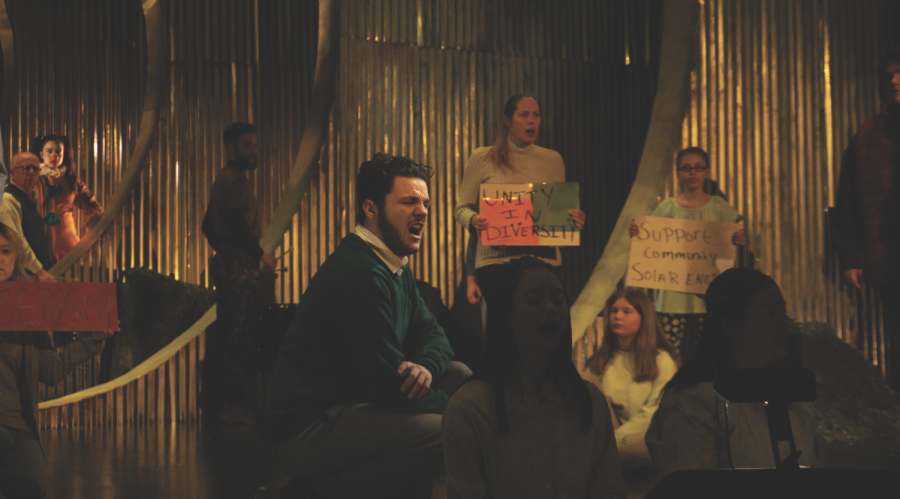Colgate Theater Department Performs “Antigone”
Despite being written over two thousand years ago, Sophocles’ tragedy “Antigone” still manages to ensnare audiences. Through minimalist props, scenery and the actors’ contemporary clothing, the performance on Saturday, March 7, in Brehmer Theater relayed the timelessness of this ancient Greek play. Familial love versus state loyalty, obligation to religion versus obligation to the law and the lengths you are willing to go for your loved ones are all concepts with which the play grapples, showing that these themes and issues withstand the test of time.
The play begins with a “translator,” dressed officially in a suit and tie, thinking aloud to the audience and addressing Antigone, who is dressed as a clown and skittishly darts around the stage, elusive as her story’s intended meaning. The translator recounts the intellectual debates surrounding Antigone, scratching at the surface of the moral complexities that come with the story that has withstood millenia. The audience is left with different theories about Antigone chasing each other through their minds. Then the lights drop, and the play begins.
Antigone angrily parts ways with her sister Ismene for her obedience to their uncle and king, Kreon, by refusing to help bury their exiled brother Polyneices. Antigone buries him alone despite Kreon’s orders, setting his soul at rest and accepting that her defiance has sealed her fate to lie beside him in death. Kreon, against the wishes of his timidly tight-lipped subjects, stubbornly refuses to show Antigone mercy.
The male chorus urges Kreon to see reason and serves as Kreon’s advisors, as well as the personification of his inner turmoil, the voice of the public, and the musical group tasked with transitioning between scenes. Kreon’s son and Antigone’s betrothed, Haemon, implore Kreon to free Antigone, but to no avail. Antigone is trapped in a cave to die a slow, agonizing death. When Kreon finally comes to his senses and frees her, she has already hung herself. Haemon, wild with grief and rage, impales himself to join her in the afterlife. Kreon, overcome with grief and regret, finally feels the consequences of his hubris.
The play is defined by the entanglement of ancient and contemporary. The actors recite the Greek tragedy while wearing modern clothes, ranging from Antigone’s leggings and sweatshirt to Kreon’s suit and tie. As Kreon is chastised by a seer for the plague that his harshness toward Antigone has brought down on Thebes, adults and children flood the stage with signs calling for improved healthcare, education and human rights. The chorus sings of man’s relationship with the gods and of Kreon’s hubris, while wearing jeans and dress shoes. The seamless incorporation of these modern elements is a testament to the actors’ performances and the malleability of Antigone’s story.
“It is difficult to determine exactly why Antigone has remained relevant for so long,” sophomore Ryan Ruhl said, whose compelling performance as Kreon was a defining element of the play.
“I believe that it’s due to its underlying thematic elements as well as adaptability. Antigone is not just a single story, there exists within it many different threads. The questions addressed aren’t just questions from the ancient Greek but questions of humanity. It is difficult to agree upon all of the show’s elements and it incites debate within ourselves as an audience.”
The performance invoked these questions of humanity with intensity. The movements of the actors were either slow, intentional, and ominous, or sudden and startling. The chorus sang in rumbling, ominous tones that were complemented by the intermittent ringing of bells that hinted at the catastrophe to come. Antigone had a solo vocal number in which the spotlight focused on her and all that could be heard in the theater was her delicate, yet assertive, voice melodically illustrating for the audience the experiences she was giving up by choosing her brother’s soul over her own life. Viewers felt the enormity of the final scenes from the stony, unwavering gazes of the silent protesters calling for equal rights and healthcare, all aspects of modern life that Antigone’s challenge to authority can relate to.
“It was the first time that I had ever seen the show and the only thing that I knew about it was from a piece based off it that I read for my Challenges of Modernity class, so I was able to see a lot of the parallels really clearly, as well as a lot of my peers that I hadn’t realized were in the production,” sophomore Ashley Bound said.
This student production was able to revive an age-old story for a modern audience in such a way that it is more clear why Antigone’s story has remained so widely renowned. Her familial values, her piety, the resilience of her principles and her fearlessness in challenging the highest authority of the land serve as a model for the Antigones of our day, and this production did the ancient heroine justice in a modern world riddled with controversy.






